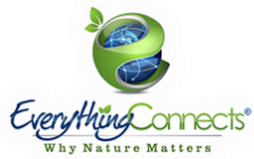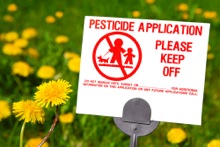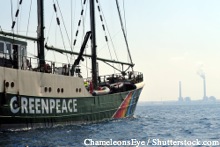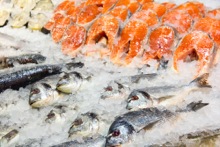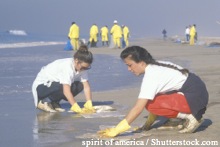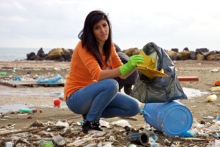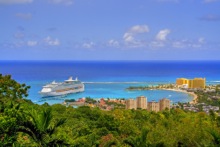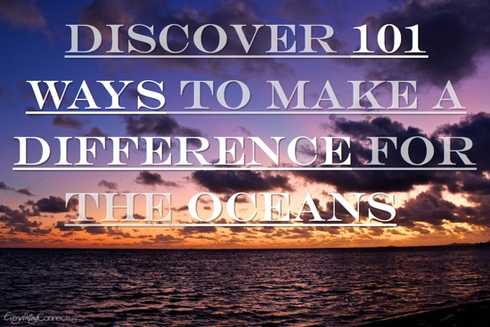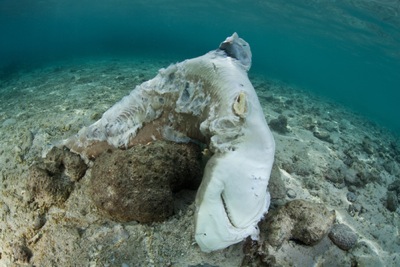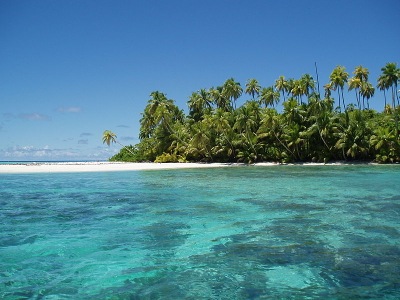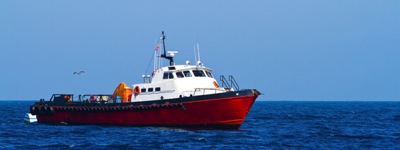Conserve the Oceans
|
Navigation
|
Throughout Earth's history, there have been five major extinction events, the last of which killed all the dinosaurs 65 million years ago. We are now in the midst of the sixth mass extinction, the first caused by a single species: humans. In the heart of this rapid succession of decline, the oceans will be affected most intensely, losing as much as five times more species than lost on land. From the tiny plankton responsible for half of all the oxygen we breathe, to the beautiful coral reefs protecting our shorelines, to the singing humpback whales, to the seafood we love, immense swaths of the ocean's creatures are being threatened by rapid and non-discriminating forces. As The Nature Conservancy puts it, "Oceans may seem vast and endless, but human activity is impacting every part of our waters and putting the health of the oceans in jeopardy. For oceans to keep sustaining us, we must find a way to sustain them." An incredible 80% of all the life on Earth lives beneath the waves as this vital, vast blue world pulses around the planet driving the natural forces which sustain life on Earth. Ocean acidification, coral bleaching, pollution, habitat loss, destructive fishing practices, overfishing and climate change are all contributing to this catastrophic loss of life and ecosystem services that will change the oceans as we know them forever, unless we act.
|
Why Live Blue?
''We've acted as if the supply of fish was limitless and it's not." ~Steve Trent, Executive Director, Environmental Justice Foundation |
Living Blue is Living Healthy!
Human and ocean health are inextricably connected. The consumption of seafood can play an important role in a balanced, healthy diet, however, some fish carry toxins and contaminants, such as mercury, which affects brain function and development, PCBs, dioxins and pesticides, that can be harmful to your health. It is important to avoid these fish not only for yourself, but also due to the fact that unhealthy fish typically come from unsustainable sources which greatly contribute to the worldwide depletion of fish stocks and to the startling fact that by 2048, scientists are predicting all the fish we eat today - extinct. If you must eat fish, choose sustainable and choose healthy to boost your omega-3 fatty acids, without risking mercury poisoning or other toxins. Otherwise, the best way to go about seafood is to not go about it at all! Learn more.
|
Explore Fish2Fork
Visit Fish2Fork and discover the campaigning restaurant guide for people who want to eat fish sustainably and be able to:
|
Select a Seafood Watch Pocket Guide
Monterey Bay Aquarium's Seafood Watch pocket guides provide insightful information on which fish are relatively bountiful and are okay to eat, which fish are overfished and are not okay to eat and which fish contain high levels of mercury, PCBs, dioxins or pesticides that pose a health risk. Choose your region below, print our your pocket guide and keep it handy! You can also use the Monterey Bay Aquarium's iPhone app as an alternative.
|
“If the fish is sustainable, then it is likely to be healthy to eat too. In general, larger longer-lived fish are more likely to have exposure to toxins due to the length of their lives and their place on the food chain. So you might be best served to stay away from them – like Bluefin Tuna or Sturgeon. Besides, these stocks have been depleted by fishing. Safer choices might be Alaskan Pollock or Atlantic Mackerel. We used the database to look for patterns of similarity between ecological and health metrics, and found that in general, choosing healthy seafood also means that you are choosing sustainable seafood. Great news for sushi-lovers! Choose the sustainable options and you also are boosting omega-3 intake, without risking mercury poisoning. We want to help people choose fish that are both eco-friendly and healthy.” ~Leah Gerber, Associate Professor and Senior Sustainability Scientist at Arizona State University
|
|
''We've acted as if the supply of fish was limitless and it's not." ~Steve Trent, Executive Director, Environmental Justice Foundation |
"Once considered inexhaustible, our oceans are now in a state of global crisis as more and more people compete for fewer and fewer fish. Overfishing threatens coastal communities and the food security of the millions who rely on marine fish as an important source of protein. Yet the solutions are in our hands, because what we buy for dinner tonight can determine whether tomorrow's generations will continue to enjoy the oceans' riches. Or not." ~ WWF
16 Things You Can Do To Help Conserve the Oceans
"The ocean covers 71 percent of the Earth's surface and contains 97 percent of the planet's water, yet more than 95 percent of the underwater world remains unexplored. The ocean and lakes play an integral role in many of the Earth's systems including climate and weather. The ocean supports the life of nearly 50 percent of all species on Earth and helps sustain that life providing 20 percent of the animal protein and five percent of the total protein in the human diet. One of every six jobs in the United States is marine-related and over one-third of the U.S. Gross National Product originates in coastal areas. The ocean is key to transportation, recreation and its resources may hold the cures to many diseases." ~National Oceanic and Atmospheric Administration |
|
Be an Ocean Hero by Supporting and Joining these Organizations Working to Protect Marine Habitats and Restore Life to the Oceans
|
|
"Seafood is one of the most popular foods in the United States, yet consumers are routinely given little or no information about the seafood they eat. Plus, the information provided is frequently misleading or fraudulent: recent studies have found that seafood may be mislabeled as often as 25 to 70 percent of the time for fish like red snapper, wild salmon, and Atlantic cod, disguising species that are less desirable, cheaper or more readily available. Seafood fraud can directly threaten human health, creates a market for illegal fishing, make it difficult for consumers to make eco-friendly choices and mislead consumers about the true availability of seafood." ~ Oceana, Seafood Fraud |
"We know that when we protect our oceans, we’re protecting our future." ~Former U.S. President Bill Clinton
|
Last Revised: 11/20/13
Commenting Rules
Commenting Rules
